Slicing through a dramatic gorge, the slight road wound upwards towards the Apuseni plateau; a wild, open area of moorland, bestrewn with peculiar Karst phenomena. Vehicles lined up ahead, still several kilometres short of Casa de Piatra, the village at the end of the road. A driver heading back in the opposite direction stopped alongside me. Window down, he gave me the news in Romanian. I smiled and said: “Sorry, I don’t understand.” Smirking, he gathered himself for a moment and proclaimed: “Road closed, no pass, no parking!” Sure enough, round the next bend, road workers with hardened faces straddled construction machinery. They were drinking beer and smoking cigarettes.
Stumped by the road closure, I strode briskly along the gravelly track in the direction of the plateau - doubting I would make the return journey before nightfall. Casa de Piatra - Stone House - snuggled into a bowl-like depression in the valley, encircled by pine forest. For a few seconds, I contemplated this odd corner of the cosmos. I was engulfed by an unexpected sense of calm; a serenity born of simplicity, timelessness, and the mundane. Time ran off differently here; the familiar tremor of slow change was perceptible all around.
A stocky man dressed in overalls was peering down into an opened car bonnet. Purplish liquid trickled from the underside of the vehicle - a miniature toxic stream that crept along the tarmac. A lop-sided wooden shed stood behind the man - the village repair shop. Another car was raised onto a platform inside, and dozens of tools lay haphazardly across the floor. Further up the road, a woman in her eighties stood boiling water inside a caravan repurposed as a local tea shop. A make-shift bar top was fixed to the rear of the caravan and a sign that read “Placinte” painted above.
Past the village, the trail ventured upwards into the forest. Rainfall floated in the air, moistening roots that protruded through the compact earth. A middle-aged couple cheerfully marched past me as I ascended along the slippery path - the only other hikers I had seen all morning. The forest gradually dwindled and I found myself on the expanse of the grassy plateau. Drizzle swept across the undulating terrain, melting into the drapery of fog that unfurled from the rocky crags above.
Near to the pass, the mist dispersed momentarily and a farmstead appeared - a scene change seamlessly performed. Three tiny dwellings with clay-coloured roofing and slender chimneys came into focus. A large, dishevelled dog was shackled up ahead, and had whipped himself up into a rabid frenzy. Akin in size to a small mule, the hound was frantic; leveraging all his brute strength to yank on the chain. I feared he might snap the metal links - a scenario that would almost certainly represent my end.
Clouds constantly rolled over the moorland atop the plateau - the atmosphere piercingly cold and dank. Far on the horizon, the images of wild horses coalesced briefly as the haze lifted, only to dissolve into formless colours as it fell once again. Free from civilisation, this expanse was a place of mystical scenes. When the curtain of cloud lifted again, it unveiled a flock fenced in by half a dozen sheep dogs. From afar, I could just about make out the figure of the shepherd himself, dressed in a bright yellow jacket. Leaning on a long cane, he drilled his canine infantry. The sheep swept across the hillside as one; a unified, shape-shifting organism; collectively complicit.
The herd drew closer, and the dogs clearly had me in their sights. I stopped and knelt down at the pass, recalling similar dicey past experiences with sheep dogs on similar such hillsides. Edging closer in formation, the canines had their gaze trained on me, as if to indicate - courteously, but firmly - that my only path was retreat. In a timely manner, the shepherd emerged across the steep pass, a fiendish grin splattered across his face. He promptly turned to berate his loyal band of companions, who forthwith obeyed and stood down. Spinning back to face me, the shepherd cordially bid me good day: “Buna ziua”, and I returned the greeting. He stared at me, beaming, without uttering another word. I nodded my farewell and continued up the pass. The dogs followed my progress with placid eyes, but I gave them a respectful wide berth all the same.
I grew weary as I returned back down the valley. Accompanied by the susurrant sounds of a stream, I ambled disheartened down the track, searching for the path that led to the Vartop Caves. I felt little like exploring more today, but a local man had raved about these ancient caves the previous day - a place notorious locally, but evidently shrouded in mystery to outsiders. Shortly after, I stumbled upon the narrow path. It was marked by a handwritten sign, mounted on a lowly wooden post, partially obscured from view. The forest interior at these lower climes felt stiflingly humid. At the mouth of the cave however, hung a veil of ominous cold air; marking the boundary between this world and the murky, ethereal underworld below.
A group congregated at the mouth of the cave: a middle-aged couple with whom I had crossed paths climbing to the plateau earlier on, and an older couple with their daughter. They were all kitted out as avid hikers, and had already donned their headlamps that bobbed up and down as they shuffled around. Keenly eyeing my approach, they simultaneously blurted out an array of comments in their mother tongue. A little taken aback by this exuberant, choral greeting, I timidly inquired as to whether they spoke English. The daughter of the older couple was first to venture forth her command of the language:
“Are you here to visit the caves?” she inquired.
“I think so, is it worth it?” I grinned, unassured.
The middle-aged woman interjected:
“It is worth it, a very special place, we are waiting for the next tour, it should start in about thirty minutes. You should join us!”
Her partner, a lanky, balding middle-aged man, hovered around anxiously just behind her. He stared at me fixedly, and his face twitched, as if he was concocting a deeply meaningful monologue, but the words were simply not lining up on his tongue in the correct sequence. Shortly after, the older couple and their daughter bid us farewell, and I approached the middle-aged couple to continue our chat. I learnt their names: Mihai and Andreea. Mihai seemed to visibly loosen up as we chatted, and he began to speak with intensity about his love of Britain, the insidiousness of EU bureaucracy, and the virtues of 1980s Romania. Andreea spoke better English, but seemed content with letting Mihai say his piece.
Natural light dissipated almost immediately as we descended into the mouth of the cavern, leaving us reliant on the feeble, narrow beams of torch light to guide us. I felt that we were being swallowed by the abyss. Though cold and dank, the cave seemed to bestow an unexpected rejuvenating force on the body. Head torch lights dashed all around, like frightened animals. We caught flashing glimpses of the cavern walls and floor, which gave off a slimy sheen, appearing almost organic. The entrance to the cave presented itself as the broad foyer of a regal, marbled theatre that had melted and warped into surrealist forms. To access the back rooms of the cave system, we stooped and crawled through low and extremely narrow openings in the rock. The floor was clammy to the touch. From the rear of the group, Mihai compulsively barked out orders for us to crouch lower, and to watch out for the gnarled fingers of stalactites that might clutch at our skulls.
In the back rooms of the chasm, the walls exhibited contorted formations that looked like the fruit of millenia of untold torment and horror. One wall was the back of a searing church organ that curved molten, like Dali’s clock. Another wall was the interior, ribbed, cellular walls of a kidney - we were being digested by this void in the earth. Dramatic, mystical and foreboding, the contours of the final room were like the inside of a sphere. The walls glowed golden, skimmed by the torch light. Stalagmites scaled upwards in the middle of the chasm like half-finished Romanesque columns, clambering higher on invisible scaffolding. Their gaunt finger tips gesticulated at stalactites adhered to the ceiling directly above them. Deposited drop by drop, over thousands of years, these disturbing monuments seemed animate; whispering ancient secrets in this deep, dank cellar in the earth.
As we emerged from the cave, Mihai seemed uplifted, and insisted we visit forthwith the largest cave in the area. Luckily, it was not far away. After descending a perilous, muddy pathway, the gaping mouth of the chasm came into view. Guarding an enormous space inside, it was formed by an unfathomably large shelf of rock resting diagonally atop a searing limestone face.
“I was here 15 years ago!”
Mihai proudly proclaimed, dancing around a little on the spot.
“And you see that hole up there?”
He signalled a three-foot by three-foot opening high up to the right of the mouth of the cave.
“With my friends, we climbed all the way inside and out through that hole”.
His claims sounded a little far-fetched, but I acted impressed.
This vast, dark den resembled an abandoned cathedral. The air was motionless, dense with moisture. Even the softest sound - the drip of water - was amplified ten fold; the echoes stubbornly refused to dissipate; each sound connected the past to the present and never truly resided in either. Time could be distorted and confused in such a place.
Deeper into the cave, the water levels rose, and the droplets from our breath dwelt tenaciously in the atmosphere in front of our faces - as if the laws of physics had gone crooked. Mihai excitedly professed that the water here originated from a deep underground river. He skipped around the cave, to point to an opening on the far wall which he claimed flowed downwards to a depth of ninety metres, one kilometre from here. I felt his stories might be imbued with more than a dose of fantasy, but he animated them with such intensity and spirit, that I wanted to believe every word.
Unsurprisingly, Mihai then insisted on us heading to the magical pool at the surface of the ninety-metre-deep sinkhole that he had just described. Andreea appeared impatient with Mihai’s insistence in lengthening the day’s activities, but agreed that I should see the spectacle. We followed the river upstream almost as far as the village and finally, reached a modest, but beautiful sapphire-green pool, encircled by limestone cliffs. It was hard to imagine this unassuming pool sank twenty five storeys deep. Mihai motioned at a small plaque mounted on the rock face along a narrow ledge around the pool. The golden plate commemorated a scuba diver who had perished here while attempting to reach the floor of the sinkhole. Mihai told that the diver’s equipment had caught on a jagged part of the wall, and he was forever held captive, eighty metres down. I pictured the chilling image of the diver; inanimate in the green murk, far down this eerie, natural drainpipe.
Unfathomable nature. And more unfathomable human nature.
Mihai and Andreea offered to give me a ride back to my car, which was at least a five-kilometre walk away. By negotiating with the road workers, they had managed to drive their 4x4 beyond Casa de Piatra. Andreea insisted that I ride up front with Mihai. The back of the vehicle was an astonishingly jumbled chaos of clothes, cooking utensils, food and bedding. As we approached the village, I inquired as to the meaning of “Placinte”, that was advertised at roadside shops all over the country. Mihai instantly pulled up, and said something to Andreea in Romanian. She sprung from the vehicle and dashed over to the caravan tea shop still tended by the eighty-year-old lady. Shortly after, she returned with what resembled thick pancakes.
“These are placinte.” She announced.
“One has jam inside, the other local cheese. Please, take them”.
I thanked them profusely for their generosity.
“People here are so happy for the business, even to make one euro for selling the placinte. That old woman probably works the fields or tends to cows as well as the shop. They do what they can to get by.” Mihai explained.
Ten minutes later they dropped me off next to my car. We bid each other a warm farewell. I went my way, they theirs.

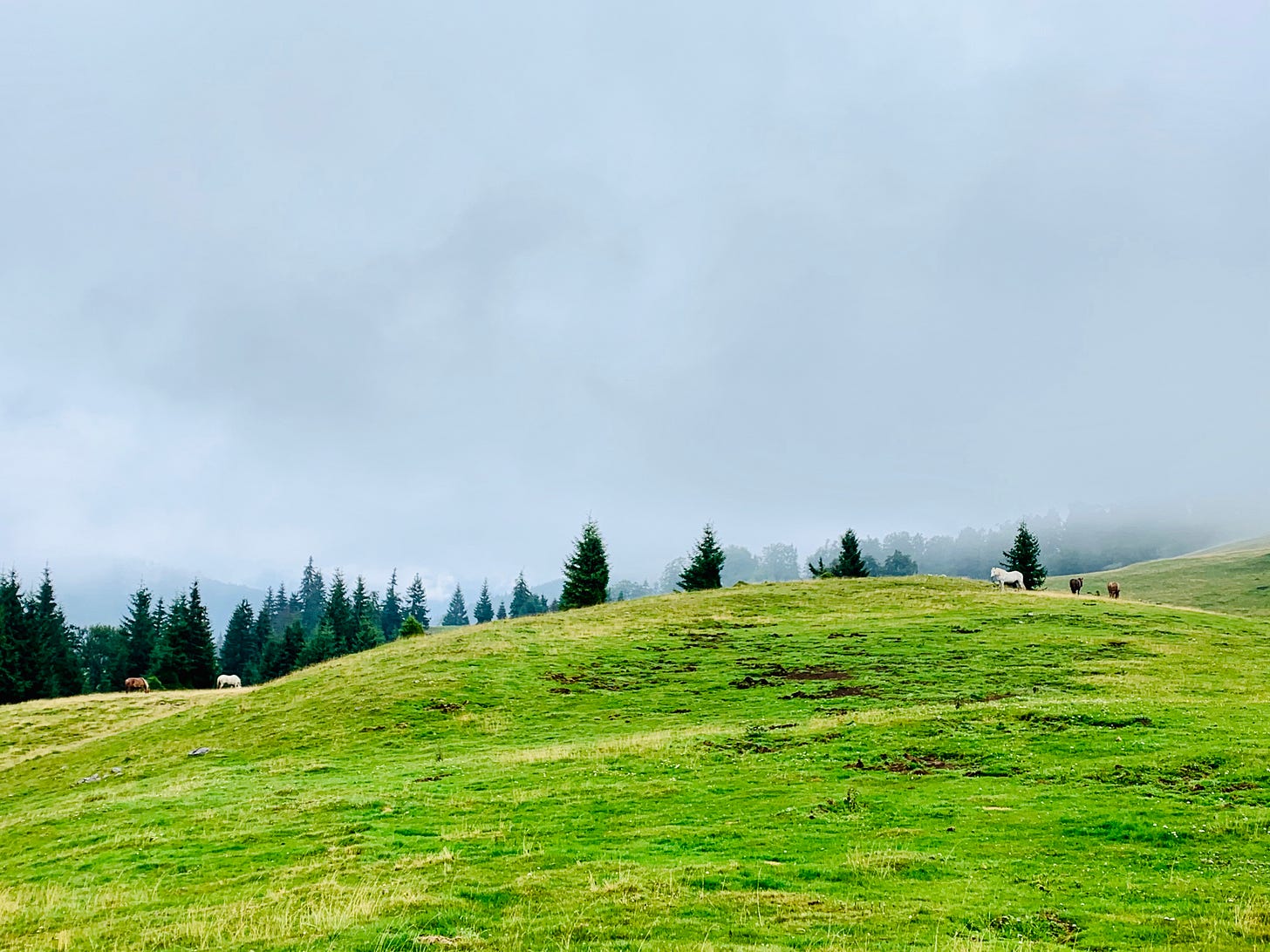
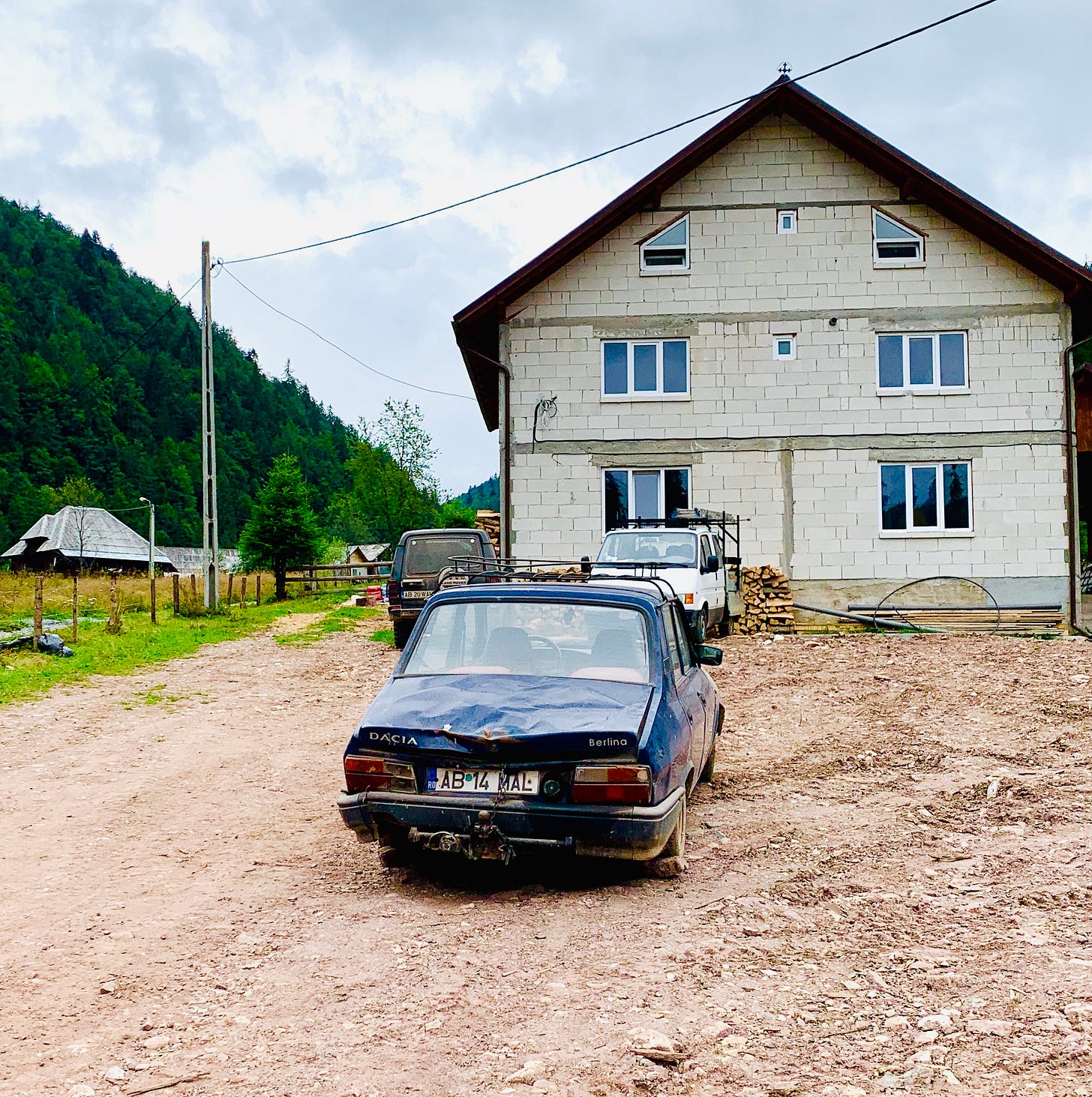
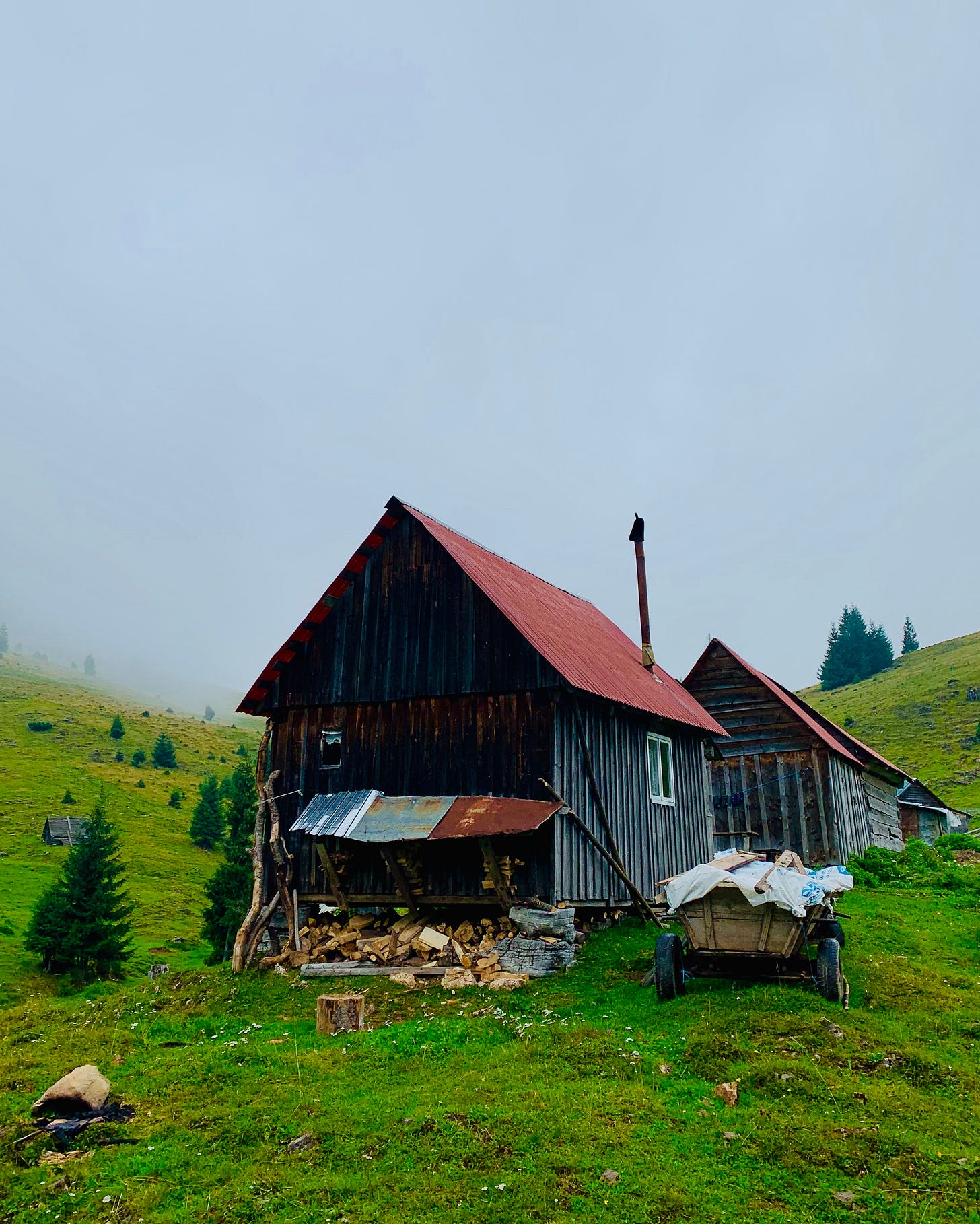
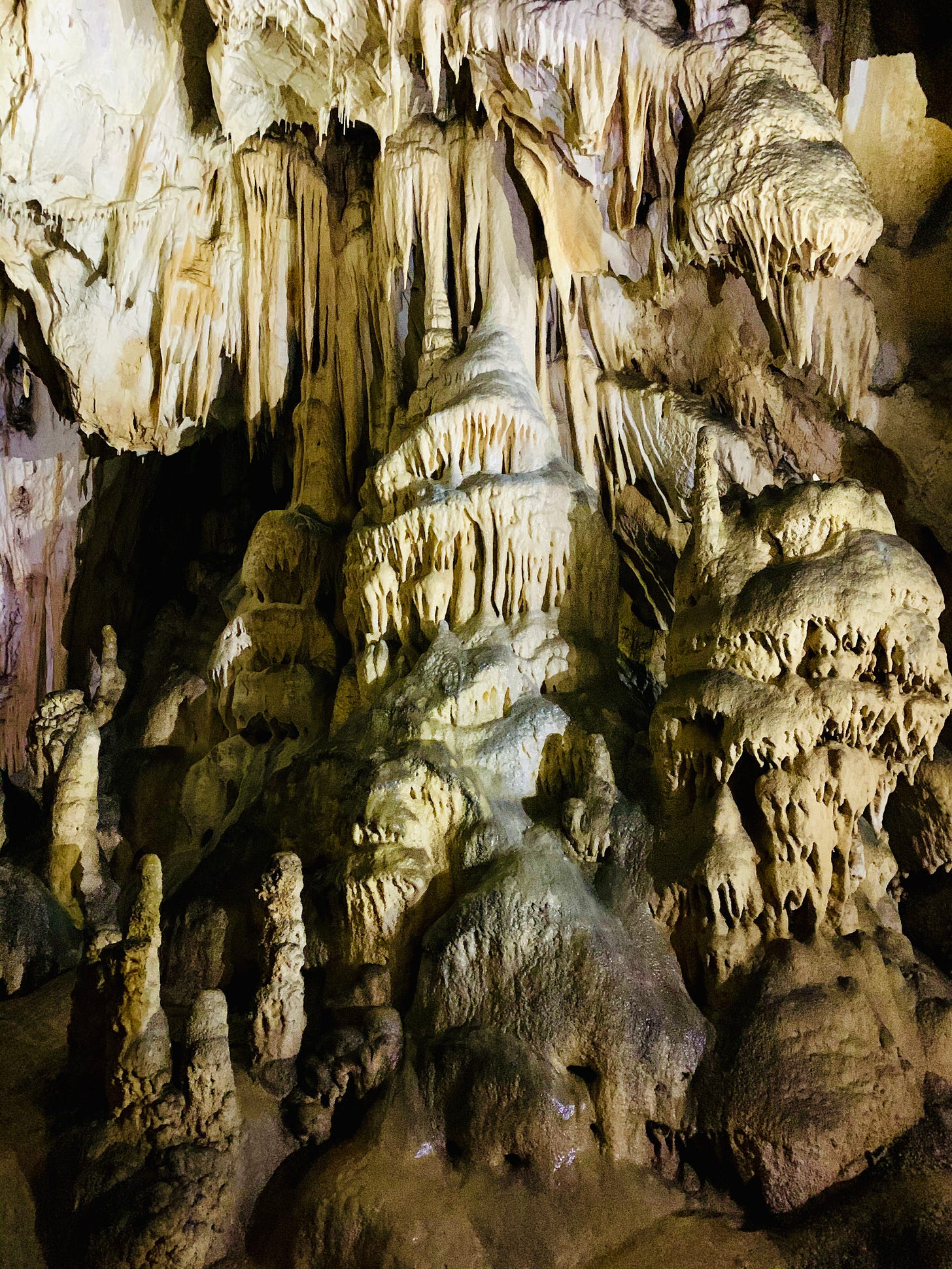
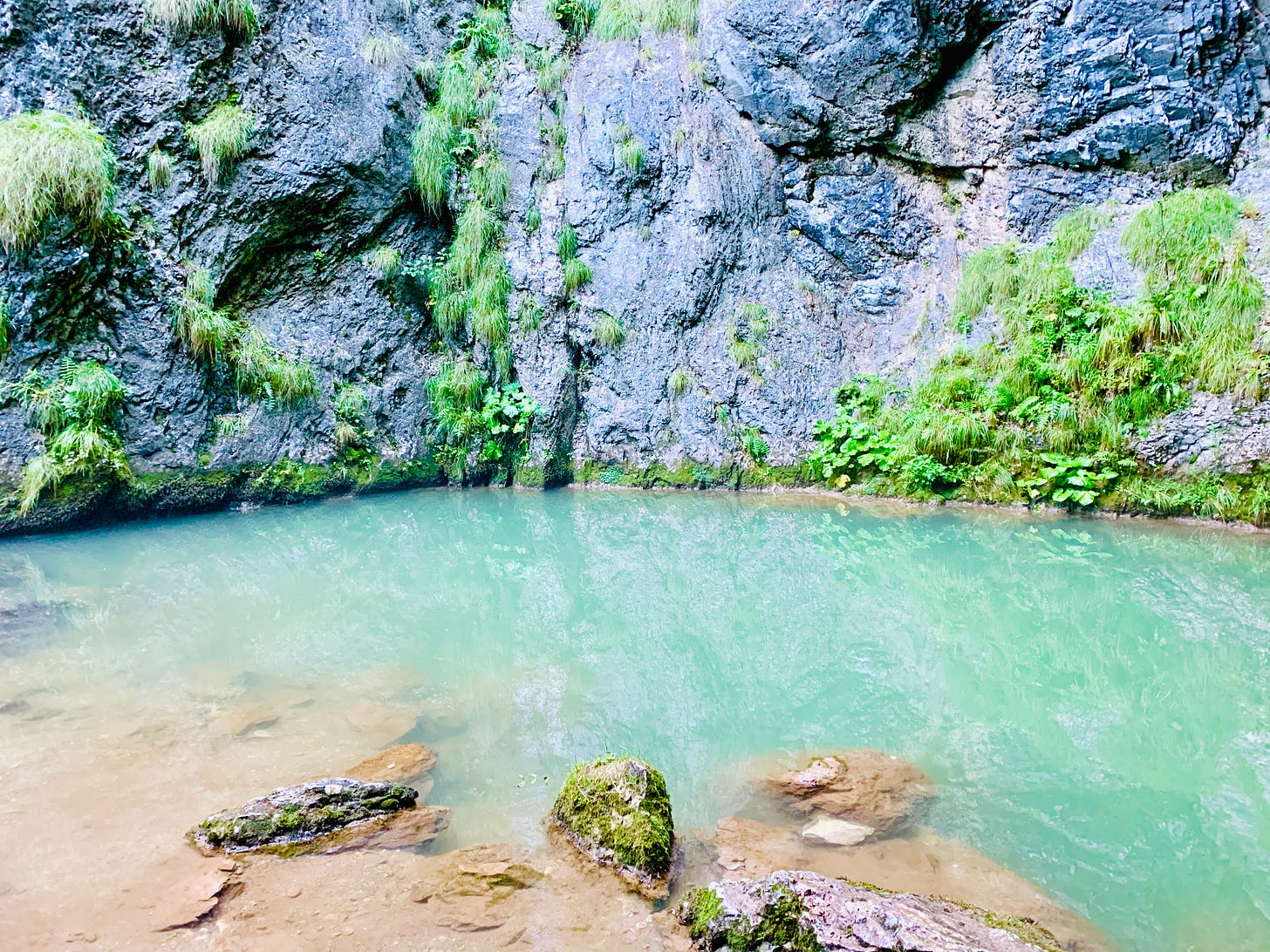
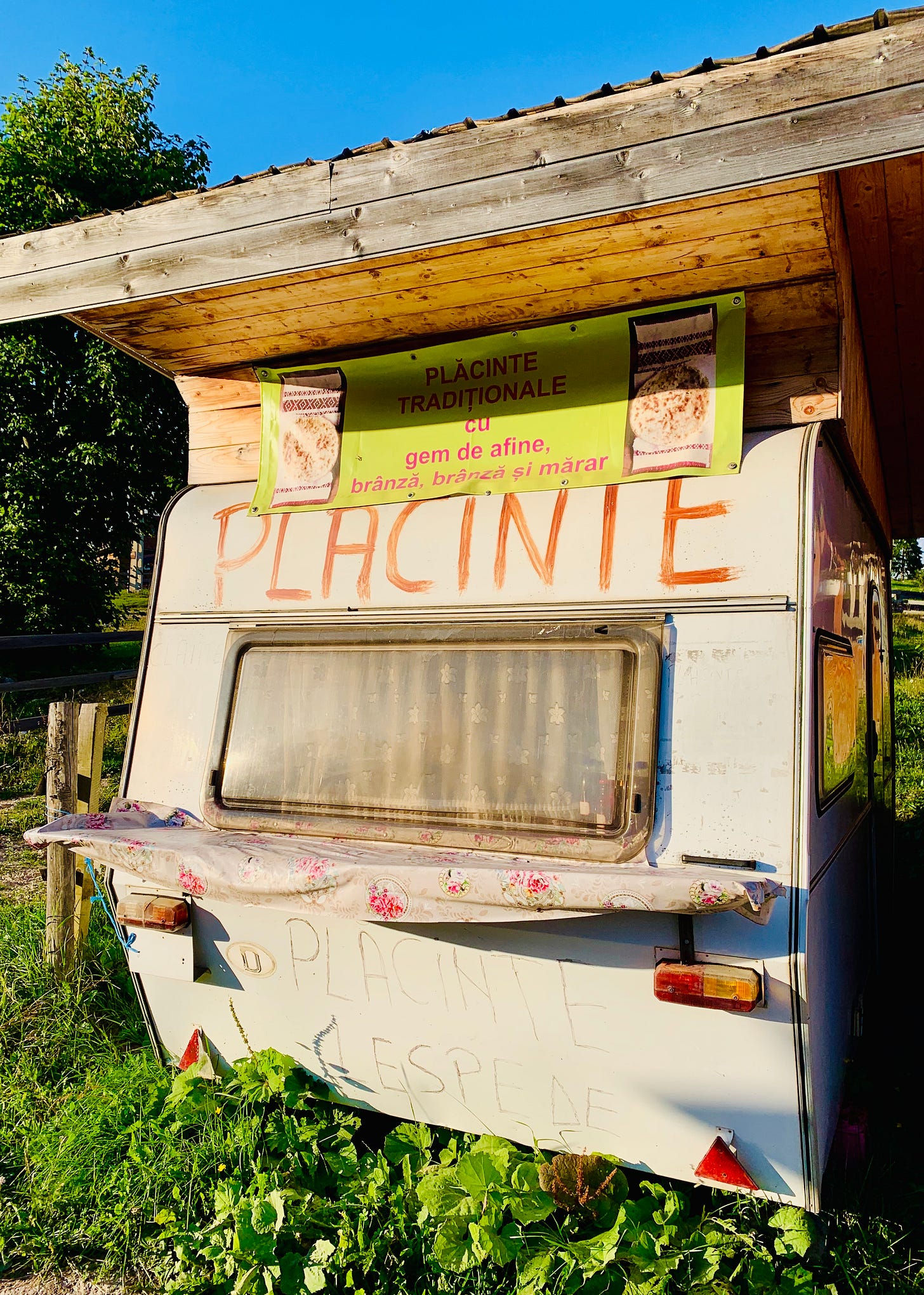
I thought this one was really excellent. My favourite so far. The human and animal interactions reallt bring the landscape to life...
Mihai and Andreea obviously enjoyed showing you around and 'looking after ' you. I imagine they are recounting the tale of the day they met an English at the caves too.
Loved reading part II.